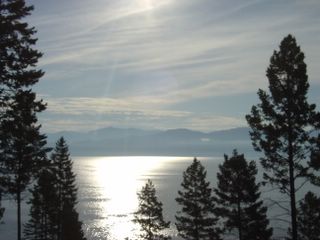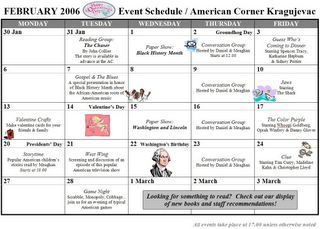Monday, November 20, 2006
We've moved!
Wednesday, November 01, 2006
New blog
Wednesday, September 27, 2006
woo-HOO!
Monday, September 25, 2006
Sweet memories
Thursday, September 21, 2006
The Montana wedding
While Serbian wedding ceremonies take place in the city hall and the Orthodox church, officiants in the US are free to conduct weddings pretty much anywhere, and many couples choose outdoor locations. (I myself was married in the Public Garden in Boston.) This trend explains why The Simpsons' Reverend Lovejoy lamented that more people don't get married "inside the church with God, instead of out here in the cheap showiness of nature."
In this case, the choice of location was also one way that the couple adapted the wedding ceremony to reflect themselves and their personality: the groom, A., grew up in nearby Kalispell, Montana. Naturally, he became an avid hiker, skier, and all-around mountain man; in addition to being convenient for his family and beautiful to look at, the Flathead Valley has an important meaning in his life. In a way, I felt that I got to know him better by just being there.
Aside from the setting, an original poem written and read by a friend, and the choice of music - during the ceremony, a string quartet played, among other things, familiar melodies from The Beatles and Radiohead - the wedding was pretty traditional. A. had his best man and three groomsmen in tuxedoes; K., the bride, had her maid of honor and three bridesmaids in matching red dresses; K.'s father walked her down the aisle; they read the traditional vows from the prayer book.
It was the first time I'd been to see friends of mine get married. The last wedding I attended was my own, nearly three years ago, and it was much less traditional. We invited only fifteen people, read silly love poetry, signed a Jewish marriage contract, and were married by a justice of the peace (not clergy) who did not mention God or use the phrase "till death do you part." It was a perfect wedding for Meaghan and me, and I've been very snobby about our decisions since then, assuming that people who had "big" weddings were sacrificing their own best interests for the sake of family pressure and tradition.
Attending A. and K.'s wedding helped me to understand why someone might actually want a big wedding. During the rehearsal dinner, which is a smaller gathering held the night before the wedding, they distributed lists of phrases describing guests who were present, such as "once transported horses across the Atlantic" or "lived on a farm in Taiwan." (Mine was "knows how to dance Argentine tango.") We were instructed to match our fellow guests to the descriptions, just like on the first day of a language class. Of course, his relatives received descriptions of her family, and vice versa.
During this activity (and in between conversations with random North Dakotan relatives) I spoke briefly to A. and K. They were taking in the spectacle of all these people meeting - their parents, cousins, friends from high school and college, everyone they care about. It was like seeing their whole life in one place. What better way to celebrate the symbolic joining of their two lives, than by physically bringing all the important people together in one place?Wednesday, September 13, 2006
Overheard at Boston Language Institute
Daniel: Mucho gusto.
ST: Ah, ¡hablas español!
D: Sí, malo znam ...
ST: ¿¿¿???
Friday, September 01, 2006
I'm writing this from "work"
Almost all, that is. I did get one caller who provided a minimum level of excitement. The exchange went something like this:
-----
- Can I talk to _____?
I check my list of extensions. The caller has asked for a name that's not on my list.
- Could you spell that for me, please?
- (Spells the name.)
I check again. Still not there.
- I'm sorry, I'm not seeing it.
- What do you mean, not seeing it? Check again. She's worked there since before you were born.
- (I spell the name back to her)?
- Yes. _____. This has been her number for the last twelve years. I don't know what the problem is.
- I don't know what I can do for you. I'm just covering the phones.
- Well, I don't know either. I mean, if you won't --
- Let's try this. Hold please.
I push a promising-looking button on the phone that will at least get rid of the call.
-----
I assume I did something right, because I never heard back from this person. But what the hell? Who talks to people that way? Did she honestly think I was twelve years old?
It's an ad, ad world
Thursday, August 24, 2006
Nedostajete mi
- Juice is still a big one. I was in the supermarket yesterday and the only reasonably priced juices are like 25% actual juice. The rest is water, corn syrup, dyes, and fillers. To get good juice, you pay something in the $3.50-4.00 range. I had to walk right by the tempting bottles of blueberry and pomegranate and settle for cranberry, as usual.
- I wrote to one Serbian friend about this: recently, I was walking by a restaurant on a beautiful day, and there were no tables outside. Something about this just seemed wrong to me. The next week, Meaghan and I were out to dinner and she was getting nostalgic for Serbia, although it hadn't come up in any way. When she thought about it, she realized that this was because we were sitting outside.
- When Meaghan and I go out with our friends here, there's always a process of planning that happens first. There's a lag time, somewhere between a day and a week, to make sure they're free, we're free, when we're meeting, what we're doing, and so on. In Serbia, when I wanted to go out (at 10 PM, whatever) I would call someone up and we'd go out.
Tuesday, August 15, 2006
Time wasters
- Epilepsy, David B
- Uncommon Carriers, John McFee
- Iron Council, China Mieville
- A Brief History of Nearly Everything, Bill Bryson
- Reruns of The District
- Buffy the Vampire Slayer on DVD
- The Daily Show and The Colbert Report
- Red Sox baseball games
- Whatever's on*
- Grand Theft Auto: San Andreas (I know, corruptor of our nation's youth)
- Minesweeper (a sure sign of desperation)
While I am walking around, I listen to music. Out of thousands (maybe tens of thousands) of iPods in Boston, I wouldn't be surprised if mine were the only one to feature Haustor and Deca Loših Muzičara (hvala, Dončiće).
Blogstuff
Monday, August 14, 2006
Work work work
Wednesday, August 02, 2006
Readjusting
Wednesday, July 05, 2006
Who cares about sports:
On a stop-over at Aukland airport I was amused to find the tourist shops selling t-shirts that read, “I support New Zealand and anyone who is playing Australia.”
I wonder if there's a geopolitical explanation for this.
Traveling

outside 30th Street Station in Philadelphia. That building on the left was completed since last time I was in Philly, and it makes an interesting architectural contrast with the old station building - something like Copley Square in Boston. Montana has beautiful natural scenery. Yesterday I drove here from Spokane, WA, through the mountains and past Lake Coeur D'Alene in Idaho. The view is very much like Brokeback Mountain - I'm sorry I didn't take any pictures for you while I was driving. (Watch this space in the next few days.) The local radio stations, on the other hand, are not so great. Your choices are Christian devotional, country, or hardcore metal. (One friend who is from here told me about a radio station that plays hardcore metal and Rush Limbaugh.) While I missed the Independence Day barbecues, parties, and even the stand-up comic in the hotel bar, I did get to see some fireworks. All the small towns in the area have their own fireworks display, and you can see them all going off at once, up and down the valley. I just pulled my car over on the side of the highway to watch. You can see five or six flashes of colored light very small and close to the horizon, and the mountains looming in the background. I guess everything is bigger out here.
Friday, June 30, 2006
On a walk around Boston
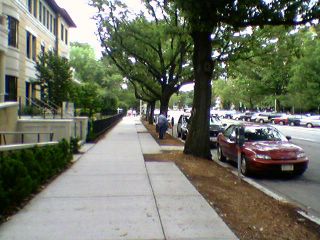
This is Beacon Street in Brookline. Notice that there are separate areas reserved for walking, parking, and driving. With no cars parking on the sidewalk, Serbian-style, there is plenty of room to stroll. To provide this amount of space to pedestrians in a city like Kragujevac or Belgrade, the city authorities need to install metal posts along the curb. Notice also the meter next to each parking space. You put coins into a slot, and a little clock tells how much time you've paid for. In Kragujevac, on the other hand, an attendant in a day-glo vest collects parking fees and tickets violators. In a post-socialist country like Serbia, the first solution to a problem is to create a government job; in the US, we prefer to invent a machine. Of course, someone has to read the meters, but the process as a whole is less labor-intensive.

I spotted this cement mixer on the campus of Simmons College. I had never before seen a piece of construction equipment painted with the lyrics to a patriotic song. If you're not familiar with the song, here's the whole text.
Tuesday, June 27, 2006
Confusion in any language
Who knew?
Sunday, June 25, 2006
Serbian habits (možeš da veruješ??)
- As many of you know, ethnic foods are one of the things we missed the most during our stay in Serbia. Naturally, when my mother-in-law, Evelyn, picked us up at the airport (in her Pontiac Bonneville, which has a passenger area big enough to fit a Fića inside), she drove us straight to a Mexican restaurant. The seating hostess came out to greet us, and I started formulating Serbian sentences in my head. I had a moment of shock when she said, "Hi."
- I got a photocopy made at a local copy shop. Copies are something like ten cents each, so my total bill was about thirty cents. I took my receipt with me to throw it away later, because in Serbia, you have to take your receipt for everything so the tax authorities can audit official receipts. I guess all those months of official signs reminding me to УЗМИТЕ РАЧУН!!! got into my subconscious.
- The selection of items available in stores surprises me. I was in a video rental club, which like most stores here has immensely high ceilings and shelves crammed with merchandise. (Students from my second-year classes will remember the Best Buy photos.) Browsing the new releases, 2-for-$30 DVDs, and 3-for-$15 pre-viewed VHS tapes, I wondered how many of these films were available on DivX.
- Making breakfast for Meaghan and Evelyn this morning, I realized that the eggs here have thinner shells and the bacon has more fat. Also, as I expected, the juice is clearly inferior. We've been drinking Cranberry-Grape, which has a rather generic fruity-sugary taste, and missing our cherry nectar. At least we have our domaća šljivovica (homemade plum brandy) for moments of nostalgia.
Thursday, June 22, 2006
Mission statement
- Stories from Serbia that I didn't have time to write when I was there;
- Stories of my readjustment to American life, giving my insider/outsider view and reverse culture shock adventures;
- Answering questions you may have about life in the US.
Friday, June 16, 2006
Visualize World Cup
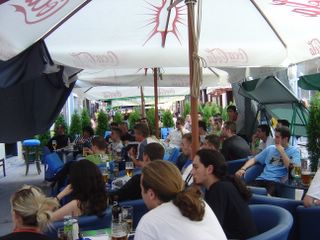 a bunch of people sitting around watching TV and groaning when their team got scored on. There was surprisingly little excitement, even at the beginning of the game before the horrors began, and surprisingly little outrage at each successive Argentina goal. Meaghan and I were the only people in this particular cafe wearing team colors: me in my Red Star Belgrade jersey, and her in a T-shirt reading SCG Цела Нација Репрезентација.
So where are the fans? The two locals I asked said that they prefer to watch the game at home. One of them elaborated: you can yell whatever you want at the TV without having to listen to the other 25 guys who think they'd do better than the coach/striker/whole team combined.
So SCG is pretty much done now, the end of the road for the only team representing a country that doesn't exist. Time to switch to my back-up team, which, for the record, is Netherlands, not Brazil - a Red Sox fan can't switch to the total frontrunner.
a bunch of people sitting around watching TV and groaning when their team got scored on. There was surprisingly little excitement, even at the beginning of the game before the horrors began, and surprisingly little outrage at each successive Argentina goal. Meaghan and I were the only people in this particular cafe wearing team colors: me in my Red Star Belgrade jersey, and her in a T-shirt reading SCG Цела Нација Репрезентација.
So where are the fans? The two locals I asked said that they prefer to watch the game at home. One of them elaborated: you can yell whatever you want at the TV without having to listen to the other 25 guys who think they'd do better than the coach/striker/whole team combined.
So SCG is pretty much done now, the end of the road for the only team representing a country that doesn't exist. Time to switch to my back-up team, which, for the record, is Netherlands, not Brazil - a Red Sox fan can't switch to the total frontrunner.
Tuesday, June 06, 2006
Don't worry, I still exist
Wednesday, May 17, 2006
Quick update
Sunday, May 07, 2006
Istanbul, Part II
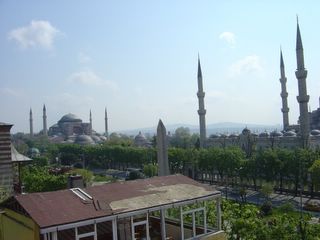
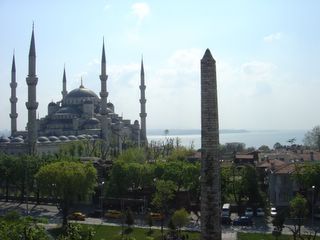 Sultanahmet is probably the most touristy place I've been since the Upper City of Quebec - or perhaps Disney World. Walking out of our hotel every day, we would hear French, Italian, and English as much as Turkish, and pass enormous white tour buses with Korean signs in the window. This presented an unrivaled opportunity for international people-watching. Take clothes, for instance. To look like an authentic Turkish man, dress in the following costume: stylish but poorly tailored gray pinstripe suit, white dress shirt, light brown loafers, hair gel. Sunglasses and bright green tie are optional. Italian men, on the other hand, can be recognized at fifty paces by their dark sweaters over check dress shirts and their square spectacle frames of thick black plastic.
Whatever they're wearing, women who visit mosques are usually requested to cover their heads. Non-Muslim women, unused to wearing headscarves, come up with a number of solutions. Meaghan bought a scarf in the Grand Bazaar and did a reasonable approximation of the Turkish style, although without that lower layer she did have some hair peeking out. Other solutions were less elegant, ranging from the knot-under-the-chin toothache look, to the one girl who actually tied the arms of her sweatshirt around her head, to a few who chose not to cover their heads at all. Having been to Morocco, where non-Muslims are not even allowed to enter any mosques except this one, we found their disrespect pretty classless.
Our guidebook had its own suggestion of how we should show respect to our Turkish hosts:
Sultanahmet is probably the most touristy place I've been since the Upper City of Quebec - or perhaps Disney World. Walking out of our hotel every day, we would hear French, Italian, and English as much as Turkish, and pass enormous white tour buses with Korean signs in the window. This presented an unrivaled opportunity for international people-watching. Take clothes, for instance. To look like an authentic Turkish man, dress in the following costume: stylish but poorly tailored gray pinstripe suit, white dress shirt, light brown loafers, hair gel. Sunglasses and bright green tie are optional. Italian men, on the other hand, can be recognized at fifty paces by their dark sweaters over check dress shirts and their square spectacle frames of thick black plastic.
Whatever they're wearing, women who visit mosques are usually requested to cover their heads. Non-Muslim women, unused to wearing headscarves, come up with a number of solutions. Meaghan bought a scarf in the Grand Bazaar and did a reasonable approximation of the Turkish style, although without that lower layer she did have some hair peeking out. Other solutions were less elegant, ranging from the knot-under-the-chin toothache look, to the one girl who actually tied the arms of her sweatshirt around her head, to a few who chose not to cover their heads at all. Having been to Morocco, where non-Muslims are not even allowed to enter any mosques except this one, we found their disrespect pretty classless.
Our guidebook had its own suggestion of how we should show respect to our Turkish hosts:
At all times show respect for Ataturk, whose picture you will see in offices, shops, and public places.In fact, you do see pictures of the founder of the Turkish Republic, a snappy dresser with piercing eyes, everywhere you go. When you step off the train, you see a three-foot-high bronze image of his face emerging from a marble wall. Our favorite restaurant, whose walls were covered with pictures of every sort, reserved one wall for Ataturk alone. Every denomination of the Turkish lira bears his picture. Now, it never would have occurred to Meaghan and me to make fun of these pictures. We're live-and-let-live sorts; every country shows its patriotism in its own way; and besides, he's a handsome fellow. But having read this advice in our guidebook put the idea in our heads, and much like Tolstoy and his white bear, we couldn't stop thinking about it. Every time we saw a picture of Ataturk, it made us want to laugh - at our guidebook! We were lucky not to embarrass ourselves. Istanbul is a great vacation destination that I would recommend to just about anyone. Its tourist hordes and hard-sell shopkeepers are overwhelming at times, but the locals know how to help you get what you want; it doesn't seem quite so foreign as Morocco does. Our book said that "nothing can prepare you for the Grand Bazaar," but compared to the sensory onslaught of Marrakech's Djemaa el Fna, we felt practically at home. We read one tourist brochure that described Istanbul as "the capital of three empires;" its most famous sights outline the history of civilization. There's one moment when you're walking into the Hagia Sophia and you see above the arch an Orthodox Christian mosaic of St. Michael; as you look down, the arch frames a giant wooden circle bearing the name of one of Muhammad's relatives in Arabic calligraphy. In that moment, you sense a coming together of east and west, past and present, and the historic weight of our ancestors' actions.
Saturday, April 08, 2006
The foreign service exam
Got good and drunk the night before, so I looked and felt my best when I went in that morning. 'Cause I wanted to look like the all-American kid ...I've never been one of those terribly driven people with focused career goals. While some kids begin college (or, in extreme cases, kindergarten) with a future job in mind, I settled on language teaching within three months of my college graduation. That said, public diplomacy is pretty much my dream job. Whenever I've been dissatisfied with my job for some reason, I've always been able to go to the State Department website, daydream a sugar-coated fairy tale of foreign service life, and make myself feel even worse. Well, today I finally did something about it: I took the Foreign Service Written Exam, a five-hour standardized test that is the first requirement for all aspiring diplomats. The exam started at 8:00 this morning, so rather than catch the 5:30 AM bus I stayed over last night with Andreja, Our Man in Belgrade. (You may have already read about him here.) He said he was busy studying for an exam of his own, on international criminal law, but I was welcome to crash in his spare room. So we had a quick dinner and he left me with a cup of coffee and the panorama of cable television to keep me company. I should have known that wouldn't last. Andreja is a party guy. Around 10 PM he came in and said, "I can't study any more. Want to go out for a beer?" Well, one beer turned into two, and then three*, and I got to witness the most impressive pinball playing I've ever seen in my life (on a machine with basically no "tilt" response, so this guy really whacked the hell out of it), and I finally got to sleep around 2. I was up again before my alarm went off at 6, and out of the house with over an hour to take a 20-minute walk to the U.S. Embassy. I took my time, got pastry and coffee, and enjoyed the misty emptiness of Tasmajdan park at 6:45 on a cool Saturday morning. I enjoyed it more knowing it was my final moment to relax in nature before hours and hours of filling in tiny circles with a #2 pencil. As for the test itself, it consists of four parts, and before each of these parts I had to sign a loyalty oath swearing not to reveal its contents. I think I can tell you this much, though: there were seven of us taking the test, including four who work at the Embassy in some non-FSO capacity and one other English teacher. The first part is job knowledge questions (history, politics, geography, economics) that, for me, involved a lot of educated guessing. Second we had to write an essay. I got about 65% into mine when time was called, so I'm hoping that they're grading on clear expression rather than actually completing one's arguments. (I had just finished proving why everyone who disagrees with me about the assigned topic is wrong, and hadn't yet explained why I'm right.) The third part was basically a personality test, and the final section was English grammar (that is, a chance to breathe). I have no idea how I did. Results will be released in late July. * It concerns me that in this blog, I'm presenting a picture of myself as an irresponsible lush. I assure you, I'm really the quiet domestic type. Really. That one night I didn't have anything to drink at all, I was just having a good time. Go back- Arlo Guthrie, "Alice's Restaurant Massacree"
Thursday, April 06, 2006
We don't have newspapers; we have walls
- Optimistic interpretation: Honestly, it makes me feel good to see that someone is at least paying lip service to a progressive political vision.
- Pessimistic interpretation: Then again, the hard right represents itself with the image of an indicted war criminal, and the left chooses the image of a dead man. These aren't political leaders, they're ikons.
- Ironic factoid: Radical Party graffiti are also common in Kragujevac. On Tuesday, I was in Novi Sad, and I saw Democratic Party graffiti for the first time. Novi Sad's city government is run by the Radicals.
Азбука
Tuesday, March 28, 2006
Your man about town
- A photo of Vincent Schiavelli; they know why.
Saturday, March 25, 2006
The big question
will you be honest and say what(or who) makes you really angry here in serbia? be honest... how do you like people here?I've heard this question dozens of times (seems like thousands), and it's hard for me to answer, partially because there's so much good here in Serbia, partially because I don't want to be an ungrateful guest, and partially because I just don't get "really angry." No matter how many times I duck the question, it keeps coming back; Serbs seem to have this masochistic desire to hear foreigners say horrible things about Serbia. Do they want the chance to defend their country against a foreigner's misunderstandings? Do they hate their country, and want independent confirmation that their own anti-patriotic feelings are warranted? Personally, I believe the key is in that "be honest" that so often accompanies the question: maybe they think that positive comments are flattery, meant to conceal the negative, "honest" truth. So, anonymous commenter, I hope you're not too disappointed to learn that I really do like it here. The people are great - as I've often said, when you make friends with Serbs, you feel that they'd do anything for you. To understand my perspective, keep in mind that I lived in an apartment building in Brookline, Massachusetts with 40 other apartments and I never met my neighbors. Here in Serbia, that kind of social isolation is impossible. When I went a couple of weeks without visiting my landlady for coffee, she stopped by and said, "What's wrong? Are you angry with me? Please have some of this cake!" I've been invited to Christmas and Slava, I've appeared on TV and in the newspaper, and I've met all sorts of interesting people - because they came looking for me. Spending so much time with so many people, I've noticed that Serbs talk about politics all the time. Of course, this is because politics effects people's lives in a very direct way: everything from the NATO bombing to the Eurosong competition bears the mark of Serbian politics, and you have to talk about it because you couldn't ignore it even if you wanted to. Luckily for me, I don't really want to. Some foreigners get frustrated with the nonstop politics, but I sort of enjoy it. (I guess it's in my nature. The other day was my mom's birthday and I called her to wish her a happy day, and we ended up discussing President Bush's newest non-plan for Iraq.) So I'm quite happy to talk politics with Serbs. Here's what does frustrate me, though:
- I'll never go to Kosovo/Montenegro myself, but Serbia can't exist without it.
- Albanians/Bosnians/"Turks" are not normal people.
- Albanians/Bosnians/Muslims are taking over the world.
- The Hague/Western media/historians are all anti-Serbian.
- I miss the good old days of Milosevic/Tito/Milos Obrenovic.
- Europe/America/everyone hates Serbs.
Sunday, March 05, 2006
Perhaps I should apologize?
Saturday, March 04, 2006
All the news that fits
Thursday, March 02, 2006
This really needs no explanation:
Thus early one evening the leading Višegrad Turks were sitting on the [bridge], cross-legged in a circle. In the centre was Osman Effendi, a tall thin pale man. Every muscle of his face was unnaturally set, his eyes were feverish and his cheeks marked all over with scars like an epileptic. Before him stood the hodja, reddish in face and small in stature, yet somehow impressive, asking more and more questions in his reedy voice. What forces had they? Where were they to go? With what means? How? What for? What will happen in case of failure? The cold and almost mischievous pedantry with which the hodja treated the matter only served to conceal his own anxiety and bitterness at the Christian superiority and the evident weakness and disorder of the Turks. But the hot-headed and sombre Osman Effendi was not the man to notice or understand such things. Of violent and uncontrolled temper, a fanatic with overstrung nerves, he quickly lost patience and control and attacked the hodja at every sign of doubt or wavering as if he were a Schwabe. This hodja irritated him and he replied to him only with generalities and big words. The main thing was not to allow the foe to enter the country without resistance, and whoever asked too many questions only hindered the good work and aided the enemy. In the end, completely beside himself, he replied with scarcely concealed disdain to every question of the hodja: "The time has come to die", "We will lay down our lives", "We shall all die to the last man". "But," broke in the hodja, "I understood that you wanted to drive the Schwabes out of Bosnia and that was the reason why you were collecting us. If it is only a question of dying, then we too know how to die, Effendi, even without your assistance. There is nothing easier than to die." "Ama, I can see that you will not be one of those who die," broke in Karamanli, harshly. "I can see that you will be one," answered the hodja sarcastically, "only I do not see why you ask for our company in this senseless attempt."- Ivo Andric, The Bridge on the Drina
Monday, February 27, 2006
In which I wax patriotic (believe it or not!)
The rest of the world is paying attention, and the rest of the world is not happy with what they see.Of course, there's truth in that, but I think it's partially because the rest of the world only sees a limited slice of what's there. America cannot be summed up by the most inconsistent and irresponsible aspects of its foreign policy. Of course, when you're from (or living in) another country, that's what you see; foreign policy is the face that America presents to the world, and I completely agree that lately, it's been an ugly face. I am continually frustrated and dismayed by stories of my country acting as if its neighbors around the world (as well as its own citizens) were imperial subjects to be treated with arbitrary cruelty and no respect for civil liberties or the rule of law. (In this respect, I would argue that the current Bush Administration's actions are categorically different from anything Clinton, Bush 41, Reagan et al. ever did, but that's another issue.) For me, the real question is why people around the world continue to idealize America, despite constant reminders * of our transgressions, past and present. If the US is so horrible, why does everyone want to move there? I would answer that there is another side to the coin: in some sense, as I have written, the US continues to be a land of opportunity. To see the difference (in a positive sense) between the US and the rest of the world, the best place to look is our system of education. As Adam Hochschild wrote (in a very insightful piece worth reading in its entirety),
...if the arrogance of American military and economic power reflects the worst about us, our schools and colleges, at their best, reflect something more hopeful.It's something I have experienced firsthand here in Serbia: the university students I teach are simply not encouraged to think for themselves. Throughout their secondary and postsecondary education, they are rewarded for listening silently to their professors, consulting other canonical experts, and repeating these "official" views (verbatim if possible) at exam time. It's not important for students of English to understand the character of Hamlet and really think about why he acts the way he does; what's essential is to know the year when Hamlet was written. The US, on the other hand, presents a society that values independence, that requires students to advocate for their own opinions (while grounding them in fact and acknowledging the opinions of experts), that recognizes that any student could be the next Harold Bloom - or the next Shakespeare. Hochschild calls it "the most vibrant civil society on Earth." It's up to us as Americans (especially those of us who live abroad) to embody this human-centered worldview, hoping to counteract the power-centered dynamic that many people around the world have come to view as characteristically American. * For those of you who have never been to Belgrade: These are photos of buildings damaged by the NATO bombing in 1999. Go back
Tuesday, February 21, 2006
Professional culture shock begins at home
Monday, February 20, 2006
"A" for effort, or, The challenges of professional culture shock
Monday, February 06, 2006
Super Boooooowwwwwwwll!!!!!
Thursday, February 02, 2006
The American dream, seen from afar
Wednesday, February 01, 2006
Blog-o-matic
Monday, January 30, 2006
New semester, new ideas
Sunday, January 22, 2006
Monday, January 16, 2006
Back to Nis, back to reality
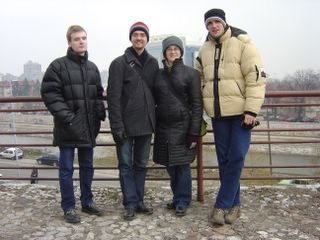 This is Dragan, me, Meaghan, and Marko in the fortress in Nis. Dragan, Marko, and Zeka, who took the picture, are students at the Faculty of Electronics. After participating in my talk at the faculty last Friday, they showed us around the town - we got to see the fortress, the Skull Tower, and the giant stage where Ceca was performing that night for Serbian New Year. Zeka also bought us some excellent burek. Thanks, guys.
I'll be back to Nis next Monday, January 23. Look for me at the American Center, where I'm presenting the pilot episode of The West Wing at 5 PM.
This is Dragan, me, Meaghan, and Marko in the fortress in Nis. Dragan, Marko, and Zeka, who took the picture, are students at the Faculty of Electronics. After participating in my talk at the faculty last Friday, they showed us around the town - we got to see the fortress, the Skull Tower, and the giant stage where Ceca was performing that night for Serbian New Year. Zeka also bought us some excellent burek. Thanks, guys.
I'll be back to Nis next Monday, January 23. Look for me at the American Center, where I'm presenting the pilot episode of The West Wing at 5 PM.
Sunday, January 08, 2006
Local Celebrities
On Thursday we had scheduled a holiday open house in the American Corner. Since we were away, we left most of the planning up to our Serbian counterparts, but we intended to make a big deal of it, so we invited press, the mayor, all my students and colleagues from the university, and anyone else we could think of. Meanwhile, I needed to get my hair cut, and an event like this provided an obvious deadline.
Whenever I get my hair cut, I have a chance to practice my Serbian. Since all of my real business happens in English, I haven’t had any real reason to learn more Serbian than “give me five eggs and a loaf of bread,” “turn left here,” and other obvious survival phrases. In the barber chair, though, I try to answer all the typical questions (“What do you think of Serbia?” etc.) in Serbian. Of course, the discussion always comes back to my progress in learning the language. The barber said that I was doing OK, but they know this guy from South Africa who has only been here a few months and speaks Serbian really well, or at least really fast.
Of course, who should happen by in the next five minutes but the guy from South Africa? They invited him in and introduced us, and made some comments I didn’t fully understand about what it sounded like when we spoke English together. This being Serbia, by the time my haircut was done, cigarettes and Turkish coffee had been produced from somewhere and everyone was taking a break.
It turns out he’s here to visit his grandmother, who lives next door to the barber shop. He arrived in June or July speaking no Serbian, found a teacher for himself, and now communicates very fluently, though his grammar does have some rough patches. His extended vacation is coming to an end soon, and he’s looking forward to getting back to Johannesburg and enjoying the hot, hot summer weather.
At this point I was really running late to meet Meaghan and get to the American Corner for our party. I rushed home and changed, and Meaghan put together a Christmassy music mix and finished the January calendar of events in time to hand it out at the party. In our hurry, we forgot the snacks and readings we had brought from the US to share with any guests.
In the end, it didn’t matter because exactly five people showed up. There were three of the regulars who come to every American Corner event, a reporter from the weekly news magazine, and his wife. We were a little disappointed but not really surprised, because it was two days before Serbian Christmas and all the university students from out of town had gone home for the holiday.
The reporter wasn’t interested in writing about the party; he had come to schedule a time to interview us for a feature story about what it’s like for foreigners to live in Kragujevac. We arranged to meet the following day, and he left. Then we sat around with our three guests for an hour or so, told bad jokes, and talked about music.
Friday we spent the morning cleaning the house, because the reporter was coming here and bringing a photographer with him – they wanted pictures of us at home. Of course, we live in a furnished house full of other people’s books and knick-knacks, but that didn’t seem to matter. The photographer had a cup of coffee with us and then took a few pictures. For some reason he insisted on photographing Meaghan in the kitchen, even when I explained to him that I’m the one who cooks! We were so startled by this that we went along with it, but the “woman in the kitchen” photo strikes us as uncomfortably sexist, and we’re hoping it doesn’t show up in print.
After the photo shoot, the photographer left for some other engagement, and the reporter stayed to talk to us. I was hoping for some interesting questions, but as it turned out, he asked us pretty much the same things we hear whenever we meet someone new. In any case, I’m looking forward to seeing my picture in the paper next week; as far as reading the story, I’ll have to find someone to translate it for me.
